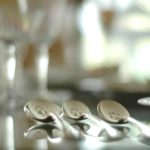 “Perfumes are the most intimate of all art forms; your skin is the canvas,” enthuses natural perfumer Sophia du Toit.
“Perfumes are the most intimate of all art forms; your skin is the canvas,” enthuses natural perfumer Sophia du Toit.
Natural perfumery is the creative art and science of using natural, aromatic, raw materials to produce perfumes, which the natural perfumer meticulously blends, dilutes, ages and bottles.
Sophia has always loved perfume: “Since I was a child, I tried concocting perfumes from naturals. It wasn’t a career option then, but I continued working privately with herbs and essential oils. When I discovered the Natural Perfumers Guild, I was hooked.”
Sophia begins her day by smelling the blends of the previous day. Working hours are flexible, but lengthy, as a lot of planning and frequent breaks are necessary: “As you work with strong concentrations of essences, you can’t work for long stretches of time, or you’ll get nose fatigue.“
Natural perfumers typically have their own home-based businesses and, until they become established, they generally need an alternative income. “Set-up costs are expensive and, as natural perfumery is still such a new art form, there are no formal employment opportunities for natural perfumers. This will change in the future, as the demand for natural perfumes grows. Commercial perfumers working with synthetics, however, may be employed by one of the big perfume companies and can earn very good salaries,” Sophia explains.
“The most rewarding aspects of perfumery include the ‘aha moment’ when you get that blend just right. Working with naturals brings such respect for the wonder and diversity of nature. Unfortunately, the ingredients are expensive and sometimes difficult to obtain, so being a natural perfumer in South Africa makes you inventive.”
To work in the line of scent, you first need a superb sense of smell. If you suffer heavily from allergies and hay fever, it’s impossible to be a natural perfumer. You need an extensive knowledge of aromatic plants, herbs, oils and extracts and their properties and constituents, as well as knowledge of how the extracts are made.
 You also need patience, as some blends and tinctures need at least six months of ageing, and some perfumes may take years to develop. Sophia states, “The bottom line is to work hard, learn all the materials, train your nose, and learn how to create. Then, as in any art, a certain sensibility, curiosity, humility, passion, and a little gifting, are necessary. Just like the ear, the nose gets trained with practice.” As natural perfumers work independently, entrepreneurial skills are essential.
You also need patience, as some blends and tinctures need at least six months of ageing, and some perfumes may take years to develop. Sophia states, “The bottom line is to work hard, learn all the materials, train your nose, and learn how to create. Then, as in any art, a certain sensibility, curiosity, humility, passion, and a little gifting, are necessary. Just like the ear, the nose gets trained with practice.” As natural perfumers work independently, entrepreneurial skills are essential.
The majority of natural perfumers are self-taught, but there are several online or distance courses available. If you wish to study perfumery formally, you’ll have to travel to France and attend a perfume school there.
If you’re intrigued by perfume, but would rather go the commercial route, the best way to get started is to join a fragrance company as a lab technician. This is an entry-level job that consists of blending the fragrance materials, as indicated by the perfumer’s formula. You then have to prove that you have the talent and drive to complete the long training process. At this point, you could be trained by an experienced perfumer, or be sent to Europe, where many of the fragrance houses have their perfumery schools.
While natural perfumery is a niche market in South Africa, natural products are enjoying an annual rise of 20 percent in sales and Sophia predicts that the demand for natural perfumes will grow even more. Natural perfumes are becoming increasingly popular, because they’re less harsh on the skin and more environmentally friendly than synthetic perfume, and because you can create unique signature blends.
It’s rare to find somebody as passionate about their profession as Sophia, and she laughs, “You know the question they always ask; ‘If you had enough money to never have to work again, what would you do?’ I would still be a natural perfumer. I wouldn’t trade it for anything.”
Jeanne du Plessis
Follow the link for books related to Natural Perfumer




